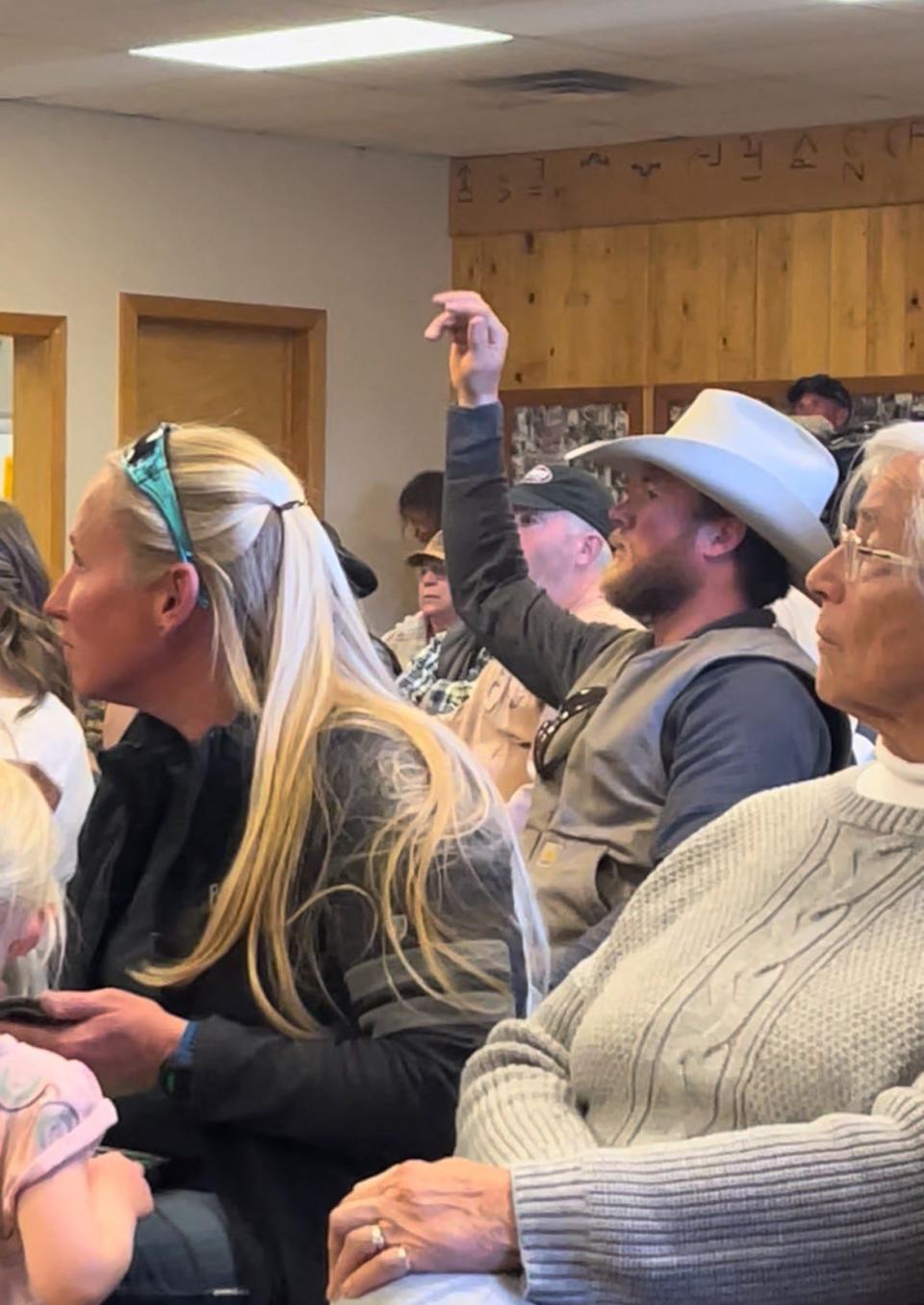Ranchers grill Colorado Parks and Wildlife staff in Kremmling after wolves kill two calves
KREMMLING — Testy ranchers fired questions at area Colorado Parks and Wildlife staff Tuesday, asking how they can protect their livestock given what they consider roadblocks to lethal removal of wolves and lack of a definition of chronic depredation at a meeting in Kremmling.
Kremmling is near where released wolves and at least one wolf from the existing North Park pack killed two calves within five days, on April 2 and April 7. Colorado Parks and Wildlife staff said at the meeting the two depredations were from two separate wolves.
The meeting, which drew around 100 attendees, was the latest in a round of similar meetings Colorado Parks and Wildlife has held on the West Slope. The meeting was scheduled before the recent depredations.

The goal of the meetings is to answer questions in hopes of stemming a growing frustration livestock producers have after 10 wolves were released in late December in Grand County, where Kremmling is located, and nearby Summit County.
Tim Ritschard, head of the Middle Park Stockgrowers Association, which includes Grand and Summit counties, credited local Colorado Parks and Wildlife staff for helping its ranchers. He said he has been in contact with Colorado Parks and Wildlife Director Jeff Davis in hopes of working together with the agency and Colorado Department of Agriculture to find ways to coexist with the wolves.
"I think he (Davis) is willing to listen but right now there is so much chaos that it's difficult for everyone," said Ritschard, who added his ranch sits between the two recent depredations. "We have to work together. We need more openness from CPW so we can bridge the gap and do this together."
He said that bridge should include identifying wolf hot spots to alert ranchers in a timely fashion of their presence and a definition of chronic depredation to establish when wolves that fit the definition should be removed under the federal 10(j) rule that allows for lethal removal in certain situations.
"It feels like a lot of this is trying to figure it out now," he said.
State wildlife staff said the agency is working through the chronic depredation definition piece. The hope is to have a definition by this summer.
Staff also addressed the frustration livestock producers are feeling over the lack of clarity of new regulations and permits to harass or kill wolves in the act of attacking their livestock and why those processes were not in place before the wolves were reintroduced.
Staff pointed out the process and regulatory changes are necessary to assure rightful compensation for depredation and for the legal harassment and killing of wolves should that become necessary.
"Shouldn't this process have been started beforehand?'' said Matt Yamashita, a state wildlife area manager. "The blanket answer is yes. The kicker with that whole thing is we are the agency being charged with creating all these rules and process. We are not the one that started this whole mechanism at the beginning. That was put in place by voters. We were provided with a timeline that to be fair it’s not a timeline that we had any chance in succeeding in getting all these mechanisms put in place and implemented in time."
State wildlife staff also talked through the different nonlethal strategies available through the agency, acknowledging those tools are mostly temporary effective deterrents and that different ranches will require different tools.
Adam Baca, the agency's wolf conflict coordinator, said the Colorado Department of Agriculture is working with Middle Park and North Park, which includes Jackson County, stockgrowers associations on funding for range riders. The two agencies announced last week they are working on deploying range riders in the coming weeks and other tools to help ranchers with nonlethal wolf deterrence.
Adam VanValkenburg, past president of the North Park Stockgrowers Association, agreed that despite frustrations, livestock producers need to continue to work with Colorado Parks and Wildlife to keep their herds safe from wolves.
As ranchers start calving season, he said it's even more stressful having wolves around as the calves are easy targets. He said Colorado Parks and Wildlife will help him put up fladry, fencing with red-range ribbons tied to it, this week to protect his herd during calving season.
"We are out there with our cattle but it's gut-wrenching to know the wolves are in your cows at night when they are bedded down,'' said VanValkenburg, who recently had wolves among his herd but did not suffer a depredation. "What’s worse is when they come within 50 yards from our house. They are not afraid of going in among your dwellings. We can only do so much to let them know they aren't welcome. Humans are not supposed to be looked at as nonthreatening to wolves, but threatening."
This article originally appeared on Fort Collins Coloradoan: Here are concerns Colorado ranchers have with wolves being released

